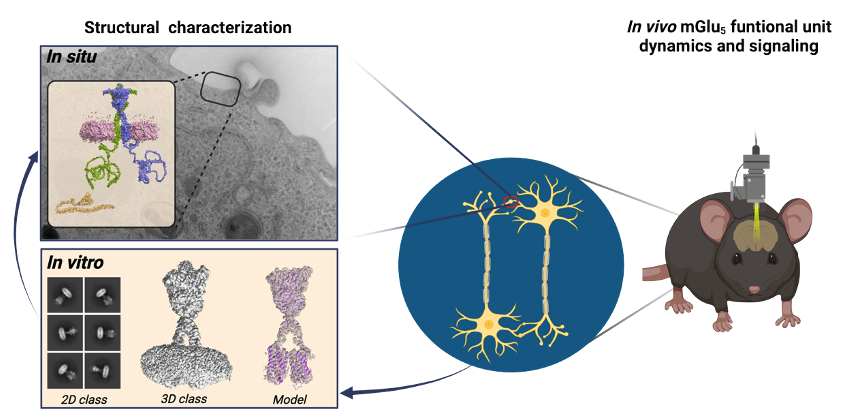As part of the “IMPACT SANTE” call from Inserm, a funding program for groundbreaking, high-risk, and impactful health research, the teams led by Guillaume Lebon (coordinator), Sébastien Granier, and Julie Perroy secured a funding of 3 million euros for their SYNAPTOR project.
The human brain is composed of billions of neurons interconnected through synapses where G Protein-Coupled receptors (GPCRs) are part of large signaling complexes, that play key roles in numerous physiological functions and brain disorders. The SYNAPTOR project aims at deciphering the molecular and structural mechanisms governing GPCRs signaling at the synapse, in the native context.

Structures, function and dynamics of GPCR functional units in situ, at the synapse.
The SYNAPTOR project will identify and characterize receptor signaling complexes defined as functional units and explore the spatial and temporal properties of their dynamic assembly and remodeling. The impact of this study is a better understanding of GPCR signaling complexes engaged in neuronal plasticity processes and behaviors but also the characterization of molecular deficiencies (and rescue) in brain pathologies, such as autism spectrum disorders.
The key concept of SYNAPTOR is to extend the molecular studies of GPCR function to their associated synaptic functional units that dynamically assemble and disassemble. Each receptor can create multiple functional units based on its potential to engage in diverse and transient protein-. protein interactions. By employing cutting-edge cryo-electron microscopy (cryo-EM) and cryo-electron tomography (Cryo-ET) technologies, in vivo genetic (Knock-In mice; expressing fluorescent mGlu5 signaling partner) and molecular pharmacological tools (high affinity monoclonal antibodies for identifying receptor), the three IGF teams are in a unique position to visualize and decipher the molecular and structural foundations of the macromolecular protein complexes at the membrane and the synapse, and to solve their structures in situ. The structural knowledge generated by the project will then be used to explore how synaptic receptor signaling platforms are regulated in space and time under physiological and pathological conditions.
Beyond establishing novel fundamental knowledge in synaptic and brain function, this proposal should uncover novel therapeutic targets for neuro-psychiatric disorders and by addressing the underlying synaptic dysfunctions should lead to the development of innovative therapeutics.
Read the Inserm press release (in french) : https://presse.inserm.fr/impact-sante-30-millions-deuros-confies-a-linserm-pour-faire-avancer-la-recherche-en-sante/70177/


